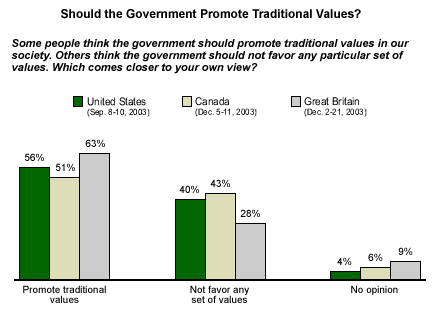In his State of the Union address in January, President George W. Bush said the values that Americans try to live by "never change" and "they are instilled in us by fundamental institutions, such as families and schools and religious organizations." Should Bush’s list of institutions have included the government?
Last year*, Gallup asked residents of the United States, Great Britain, and Canada whether they think their governments should promote "traditional values" in their societies, or not favor any particular set of values. Majorities in each country said their respective governments should promote traditional values, but Britons are the most likely to hold this view: 63% of Britons chose this response, compared with 56% of Americans and 51% of Canadians.

The poll question does not define the phrase "traditional values," rather the respondent is allowed to think of it in whatever way he or she thinks is appropriate. So when respondents in different countries answer the question, they could be thinking about different things. For example, in the United States, traditional values often revolve around marriage and family, personal morality, a strong work ethic, freedom, and integrity. In Great Britain, lists of traditional values also typically include honesty, duty, tolerance, and honor. Courtesy, peace, order, and equality are frequently included among Canadians’ core values. In Great Britain, the United States, and Canada, demographic groups who are typically associated with traditional values, or associate themselves with traditional values, are most likely to favor government promotion of these values.
Great Britain
In Great Britain, the preference for government promotion of traditional values rises with age and is also popular among those who associate themselves with the Conservative Party. Fifty-one percent of Britons aged 18 to 34 prefer government promotion of traditional values, as do 63% of those aged 35 to 44, 70% of 45- to 64-year-olds, and 67% of those aged 65 and older.
Seventy-four percent of British adults who said they were inclined to vote for the Conservative Party, which has historically been associated with a traditional values platform, said government should promote traditional values in their society. Sixty-one percent of Britons who are inclined to vote for the Labour Party said government should promote traditional values, while 54% who lean toward the Liberal Democrats shared this view.
The United States
Similarly, political ideology is a solid indicator of support or disdain for government promotion of values in the United States. In the United States, the term "traditional values" has become a catch phrase for conservatives, and conservatives are among the most likely to support government advocacy of these values. Sixty-seven percent of conservatives, compared with 54% of moderates and only 35% of liberals, said government should promote these values. Sixty-two percent of liberals think that the government should not promote a particular set of values.
Canada
Gallup respondents in Canada were not asked to identify their political ideology or partisanship, so it is unclear if a similar relationship exists between political views and support for the government promoting traditional values. However, Canadians with children under age 18 were more likely than those without to say the government should promote traditional values: 61% of Canadians with children under 18 said the government should do so, compared with 47% of those without children in this age group.
Bottom Line
If majorities of respondents in each country want their government to espouse traditional values, rather than not favoring any set at all, does this indicate a perceived values deficit? In Great Britain, 62% of Britons -- similar to the 63% who said government should promote traditional values -- said in an earlier 2003 survey that they were dissatisfied with the moral and ethical climate in their country. In the United States, 60% of Americans said the same about the U.S. moral climate. Far fewer Canadians -- just 37% -- said they were dissatisfied with the moral and ethical climate in their country.
*Results in the United States are based on telephone interviews with 1,017 national adults, aged 18 and older, conducted Sept. 8-10, 2003. For results based on the total sample of national adults, one can say with 95% confidence that the maximum margin of sampling error is ±3 percentage points. The survey was conducted by Gallup USA.
Results in Canada are based telephone interviews with 1,012 national adults, aged 18 and older, conducted Dec. 5-11, 2003. For results based on the total sample of national adults, one can say with 95% confidence that the maximum margin of sampling error is ±3 percentage points. The survey was conducted by Gallup Canada.
Results in Great Britain are based telephone interviews with 1,000 national adults, aged 18 and older, conducted Dec. 2-21, 2003. For results based on the total sample of national adults, one can say with 95% confidence that the maximum margin of sampling error is ±5 percentage points. The survey was conducted by Gallup UK.